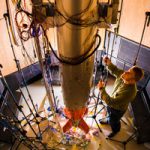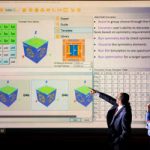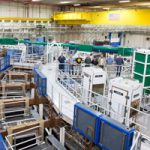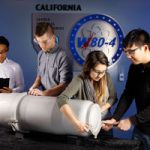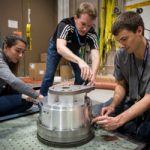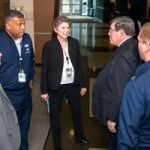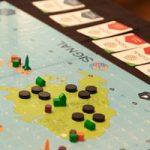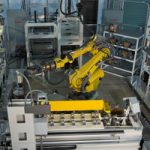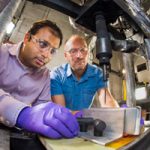B61-12 team reaches milestones in nuclear deterrence mission
Sandia’s B61-12 nuclear weapons team has accomplished several milestones, including the gravity bomb’s final design review and the first production completion of several components for the life extension program. Sandia and LANL presented the B61-12 design for final review to an independent peer-review panel of 12 military and civilian experts last fall.
Sandia’s Tidwell talks to Congress about water-energy issues
Vince Tidwell of Sandia’s water program testified last month on DOE’s research and development into the connections between energy and water before the U.S. House of Representatives Committee on Science, Space and Technology.
Mirage software automates design of optical metamaterials
Sandia software developers have created the first inverse-design software for optical metamaterials. The new software lets users design science-fiction-like materials with the same efficiency that architects use when they draft building plans.
Device in Z machine measures power for nuclear fusion
To better determine energy leaks at Sandia’s powerful Z machine — where remarkable gains in fusion outputs have occurred over the last two and a half decades, including a tripling of output in 2018 — a joint team from Sandia and Lawrence Livermore national laboratories has installed an upgraded laser diagnostic system.
W80-4 Life Extension Program achieves major milestone
The W80-4 Life Extension Program achieved a major milestone last month when the joint DOE and Department of Defense Nuclear Weapons Council approved the program to enter Phase 6.3, development engineering. The approval follows multiple briefings by the W80-4 leadership team to program stakeholders at NNSA headquarters and the Pentagon.
Process modernization
Modernizing the nuclear deterrent also means modernizing the weapon development process. To this end, Sandia and the Kansas City National Security Campus have established the New Product Introduction initiative. By integrating lessons learned from past weapons programs and industry best practices into the existing process, NPI can help enhance the security, reliability and performance of the nation’s nuclear deterrent.
Air Force officials learn about Sandia/CA weapons contributions
U.S. Air Force Lt. Gen. Richard M. Clark, deputy chief of staff for Strategic Deterrence and Nuclear Integration, visited Sandia California last month to familiarize himself with the site’s contributions to national security through nuclear weapons.
CALLING GAMERS: Future nuclear security experts train with Sandia-designed game
The next generation of nuclear security experts is being trained in an exciting new way — by playing a first-of-its-kind war game Sandia helped design. The game, Signal, which goes online this spring after its launch as a board game last year, offers players a chance to make strategic decisions using modern political, economic and military tools.
Robotics system demilitarizes 700,000 Army submunitions
More than 700,000 Multiple Launch Rocket System submunitions have been demilitarized since the Army started using an automated, nine-robot system conceptualized, built and programmed by Sandia engineers.
Extreme fast-charging batteries
A key roadblock to widespread use of long-range electric vehicles — the longer time needed for a complete recharge compared to a gas station fill-up — may soon be overcome, thanks to DOE support for extreme fast-charging battery research. Fueled by a $1.5 million award from DOE’s Vehicle Technology Office, Sandia and the University of Michigan have teamed up to develop engineered battery materials that can be charged in less than 10 minutes.
